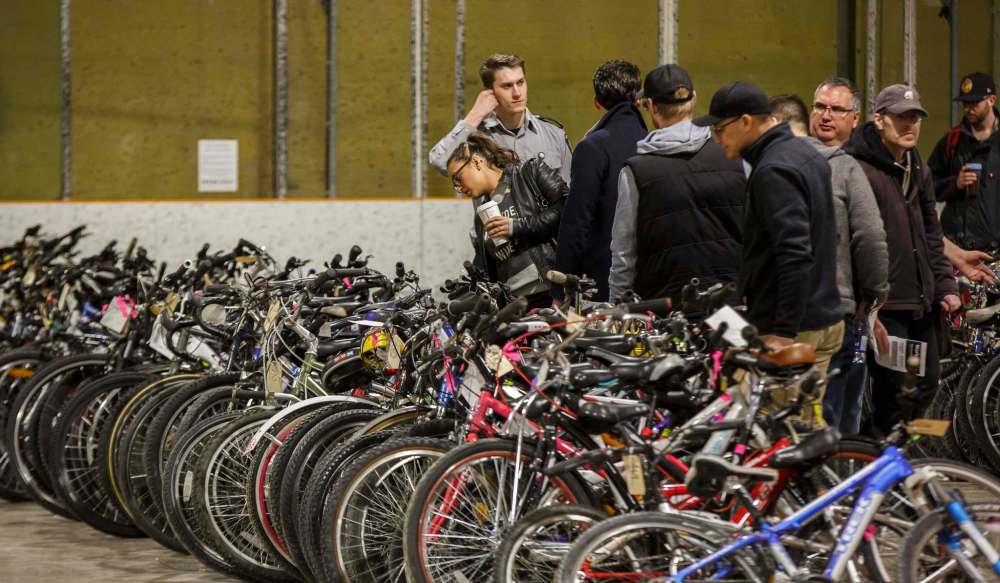Bike-part sellers may soon have ID recorded
Advertisement
Read this article for free:
or
Already have an account? Log in here »
To continue reading, please subscribe:
Monthly Digital Subscription
$1 per week for 24 weeks*
- Enjoy unlimited reading on winnipegfreepress.com
- Read the E-Edition, our digital replica newspaper
- Access News Break, our award-winning app
- Play interactive puzzles
*Billed as $4.00 plus GST every four weeks. After 24 weeks, price increases to the regular rate of $19.00 plus GST every four weeks. Offer available to new and qualified returning subscribers only. Cancel any time.
Monthly Digital Subscription
$4.75/week*
- Enjoy unlimited reading on winnipegfreepress.com
- Read the E-Edition, our digital replica newspaper
- Access News Break, our award-winning app
- Play interactive puzzles
*Billed as $19 plus GST every four weeks. Cancel any time.
To continue reading, please subscribe:
Add Free Press access to your Brandon Sun subscription for only an additional
$1 for the first 4 weeks*
*Your next subscription payment will increase by $1.00 and you will be charged $16.99 plus GST for four weeks. After four weeks, your payment will increase to $23.99 plus GST every four weeks.
Read unlimited articles for free today:
or
Already have an account? Log in here »
Hey there, time traveller!
This article was published 03/01/2020 (2125 days ago), so information in it may no longer be current.
As rampant bike theft continues to grind cyclists’ gears, the city is considering updating bylaws to keep tabs on all scrap metal and bike part sellers.
A new public service report recommends ways to deter theft in response to the growing crime, which has been linked to the methamphetamine crisis; stolen bikes are reportedly taken to chop shops, where, police have said, they are sometimes exchanged for hits of the drug.
With thieves in search of quick cash profits, they also end up on online classified ads and at scrap metal yards.

The report’s recommendations to combat theft are twofold: to require businesses who buy scrap metal or bike parts to obtain licences, and to promote the city’s voluntary bike registry. They will be discussed at a protection, community services and parks committee meeting next week.
Under the former, businesses dealing in scrap metal would require a “used goods dealer” licence while purchasers of bike parts would need a bicycle dealer licence. Both would then have to keep photos and copies of identification from every individual they buy from.
“[The licencing changes] will assist in curbing avenues for disposing of stolen bikes for money, and provide police with more tools to investigate stolen bikes and bike parts,” wrote Winston Yee, the report’s author and city bylaw enforcement manager.
The requirements are outlined in the Doing Business in Winnipeg bylaw, which regulates pawn shops and other resellers. A used goods dealer licence would cost $1,320 every year. A bicycle dealer one would cost $470.
Yee noted the recording ID wouldn’t be a legal privacy concern because the information would be collected for the purpose of law enforcement and crime prevention.
Mark Cohoe, executive director of Bike Winnipeg, said he hears about bike theft regularly, and there are no signs the crime is slowing.
“Anything that can be done to curb that is beneficial,” Cohoe said.
An estimated 3,000 bikes are reported stolen in Winnipeg every year. According to the City of Winnipeg’s website, it recovers as many as 1,000 annually, but less than 10 per cent are returned to their rightful owners.
Cohoe applauds the public service’s recommendation to promote the community registry, although the cycling enthusiast said he thinks it would be beneficial to make registration mandatory at point-of-sale. He had yet to register his bike Friday, although he said he planned to.
Cyclists can pay a one-time, $6.70 fee to register a single bike on the website, which records serial numbers. According to Yee’s latest report, the registry saw an initial increase of registered bikes over 800 per cent per year since the registry was created in April 2018.
Yee recommended the city doesn’t go ahead with making registration mandatory, citing community consultation that found little support for the measure. He noted most major cities in Canada have a voluntary registry.
“Consequently, effort will continue to be focused on increasing awareness of this program, improving the user experience, as well as other public messaging and education around bike security,” he wrote.
Community services committee chair Sherri Rollins (Fort Rouge – East Fort Garry) said Friday the intent of requesting the report in the first place was to find ways to disrupt bike theft and how the sale of scrap metal interrelates with drugs.
“Can we be putting another tool in the toolbox? That’s the conversation I expect to have on Wednesday,” she said.
The committee will vote on the report’s contents for the first time on Jan. 8.
maggie.macintosh@freepress.mb.ca
Twitter: @macintoshmaggie

Maggie Macintosh
Education reporter
Maggie Macintosh reports on education for the Free Press. Originally from Hamilton, Ont., she first reported for the Free Press in 2017. Read more about Maggie.
Funding for the Free Press education reporter comes from the Government of Canada through the Local Journalism Initiative.
Every piece of reporting Maggie produces is reviewed by an editing team before it is posted online or published in print — part of the Free Press‘s tradition, since 1872, of producing reliable independent journalism. Read more about Free Press’s history and mandate, and learn how our newsroom operates.
Our newsroom depends on a growing audience of readers to power our journalism. If you are not a paid reader, please consider becoming a subscriber.
Our newsroom depends on its audience of readers to power our journalism. Thank you for your support.



